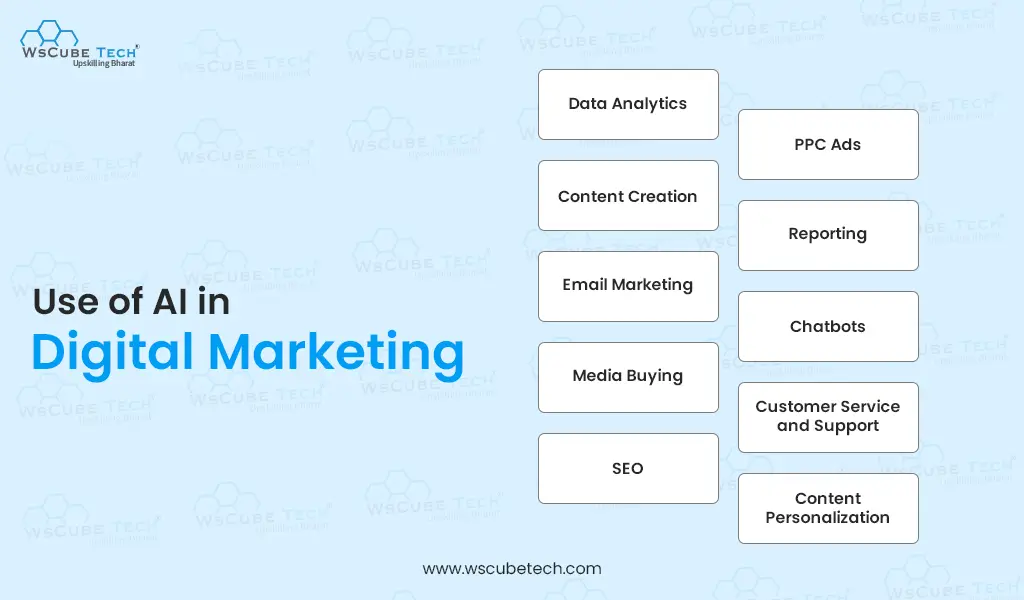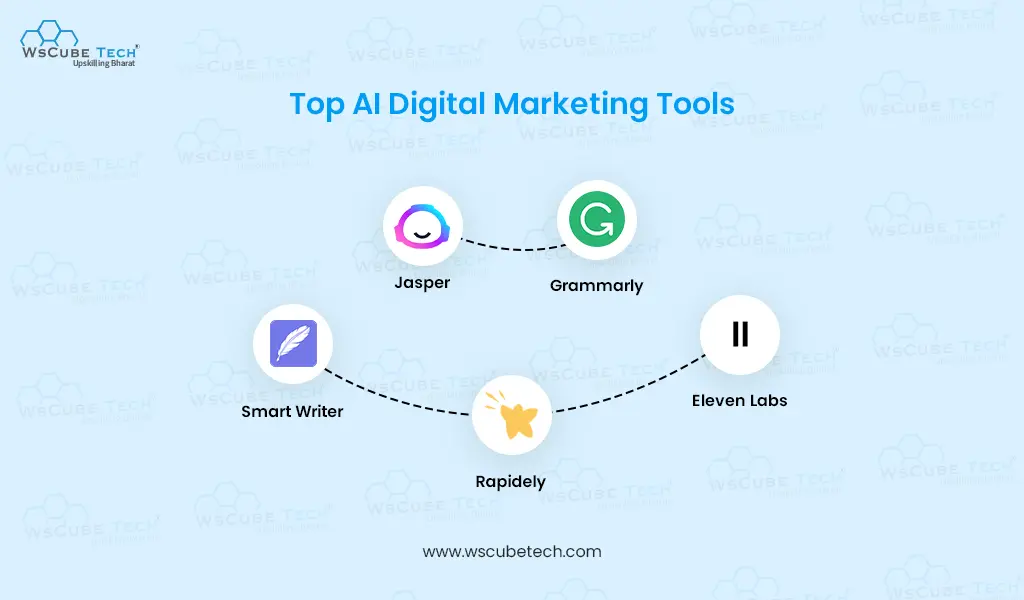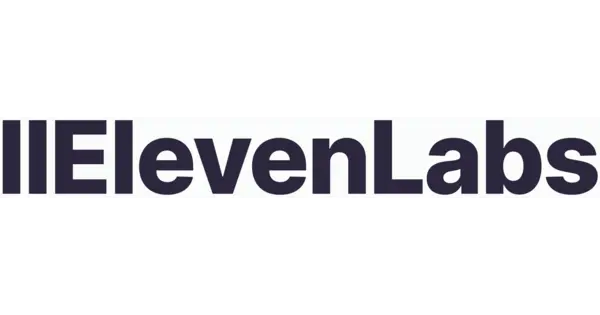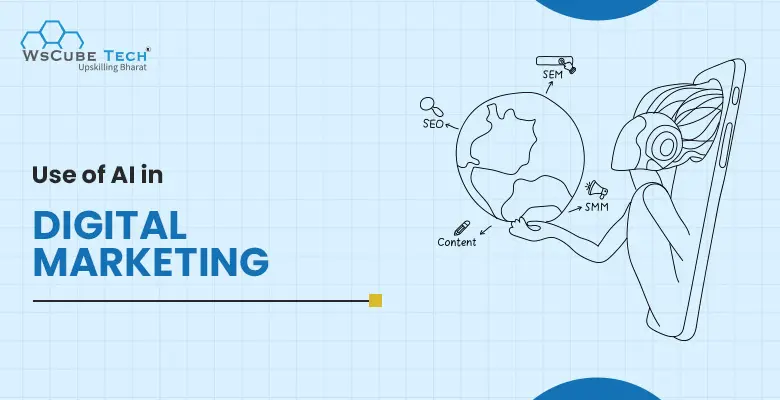Artificial Intelligence (AI) has completely changed the digital marketing landscape. Artificial intelligence in digital marketing is a game-changer, especially for customer services, content creation, and forecasting.
Thanks to AI-powered tools, predictive analytics, personalized ads, and customer experience have improved significantly.
If you also want to take your digital marketing efforts up a notch, then it’s time to embrace AI. It will help you offer better and more personalized solutions to the audience and improve ROI.
In this blog, we will explore what AI in digital marketing means, its examples, tools, and uses in the industry. We’ll also take a look at the benefits and challenges of using artificial intelligence for digital marketing and the skills you need to leverage it for your business.

What is AI in Digital Marketing?
AI in digital marketing uses artificial intelligence technologies, such as natural language processing (NLP), machine learning, and more, across different marketing strategies and practices to collect customer data and automate marketing tasks.
The use of AI in digital marketing helps businesses gain insights into customer behavior by processing large databases. They can customize their promotional campaigns, content, and materials to meet the needs and preferences of the target audience.
AI can quickly adapt to marketing trends and improve strategies using new data and feedback. It also makes marketing more targeted and precise, which offers seamless customer journeys and higher conversion rates.
AI-powered digital marketing uses algorithms and machine learning to process vast amounts of data in various online interactions. This includes information collected from emails, social media, and users’ choice to buy products online. It can extract information quickly and with so much accuracy that humans can never. Moreover, AI can communicate with customers like humans and solve their queries.
It can automate repetitive tasks, personalize content, predict results, and analyze customer behavior patterns.
This means using artificial intelligence for digital marketing can work wonders. It allows marketers to explore more opportunities and perform their jobs more effectively. They can offer users more valuable and relevant content and better convey the brand message.
New AI tools are coming to the market almost every day, making marketers’ jobs easier and faster. However, theory can never replace human efforts, intelligence, and roles. It will always need human skills to work and yield results efficiently. To learn how to leverage these tools to do your job effectively, sign up for our digital marketing course designed by industry experts.
Upskill Yourself With Live Training (Book Free Class)
Also Read: Full History of Digital Marketing (Origin, Evolution, Timeline)
How to Use AI in Digital Marketing?

As artificial intelligence is becoming easier to use and more accessible to people, markets are using it in their daily tasks, from creating content to scheduling social media posts to sending emails and whatnot.
In a survey, 64% of marketers said that they use AI in some form for their tasks, and 21% of marketers accepted that they had integrated it extensively into their workflows.
Research has concluded that the top three uses of AI in digital marketing are data analysis (40% of marketers), research (39% of marketers), and content (38% of marketers).
Let’s delve into the role of AI in digital marketing, explaining how it is used in different marketing fields and strategies:
- Data Analytics
- Content Creation
- Email Marketing
- Media Buying
- Customer Service and Support
- Content Personalization
- SEO
- PPC Ads
- Reporting
- Chatbots
1. Data Analytics
Today, we can access a large amount of data from multiple sources without hassle. However, with so much data and information available from various channels, it can be challenging for marketers to process it.
Therefore, they rely on AI to analyze and process data from diverse sources faster. They can evaluate the performance of different marketing campaigns, determine success patterns, find weaker areas, gain deeper insights, and predict trends and behaviors to develop effective marketing strategies.
AI technology is also helpful in identifying anomalies and detecting patterns. It helps businesses understand their target audience to execute more targeted campaigns and adopt a personalized approach to connecting with customers. It automates the data collection and analysis process, which enables competitor analysis. Companies can use this information to track what other brands are doing and gain a competitive edge.
For example, the Advanced Data Analysis plugin makes ChatGPT a powerful data analysis tool, which lets users feed a spreadsheet to the platform and uncover insights.
However, to make the most of AI and optimize marketing campaigns, you need a well-equipped customer data platform, so AI can extract useful information and process it as per requirements.
2. Content Creation
Content writers and editors often struggle to create unique and engaging content for different channels within the stipulated time. This is because creating compelling and quality content takes time, and most content marketers lack the resources.
That is where AI comes to the rescue. It can create different types of content, including blogs, social media captions, posts, email copy, and much more within a few minutes. It can also help designers and marketers create images, videos, and audio.
The role of artificial intelligence in digital marketing is now more prevalent in content creation, especially since the introduction of tools like ChatGPT and Jasper. It can generate outstanding content for landing pages, blogs, websites, email subject lines, ad copies, etc. It can also craft attractive and catchy headlines and customize content to add a touch of personalization.
There is no denying that using AI in content creation saves ample time and effort. However, you can’t trust it blindly. Only 6% of marketers have agreed they publish AI-generated content without reviewing or making changes. Make sure to review AI-generated content before publishing. Use it as a starting point to explore an idea, create an outline, and add your brand voice. Check all the facts and edit content to ensure it sounds more human.
3. Email Marketing
Email marketing is an integral part of any online marketing campaign as it allows brands to create a loyal and long-term connection with customers. Also, it informs people about the latest offers, events, products, and deals. Companies use emails to stay connected with potential and existing clients, get their attention, and convert leads.
Although automated email marketing is not a new concept, AI produces more engaging messages for emails and helps companies understand more about email list behaviors. It also saves time and enhances performance. As marketers spend less time brainstorming, they can focus on other productive tasks.
By incorporating AI in email marketing, brands can conduct workflow analysis, curate dynamic content, develop customized email copies, perform A/B testing, evaluate email performance, and more. That’s not all. AI tools can compare metrics to find the value of email addresses and lists. You can schedule emails depending on the value generated by each email. With expansion and growth of AI, it will become more crucial in any marketing stack.
4. Media Buying
Earlier, media buyers used to select billboards and websites manually to display their ads. This would consume a lot of time and resources. Fortunately, we have AI now that has replaced manual tasks and made media buying automated.
Platforms are now leveraging AI to select the best ads and media placements to reach their audiences and maximize ROI. The most significant impact of AI in digital marketing is in PPC. Businesses use AI during auctions to find the top place in Google Ads.
AI tools also make recommendations regarding ad spend and boost your PC campaigns to help you reach the target users and improve performance.
Also Read: What Does a Digital Marketer Do? Work, Roles, Responsibilities
5. Customer Service and Support
One of the primary objectives of digital marketing is to enhance customer experience and offer better services. Therefore, marketers trust AI-driven chatbots that can communicate with prospects and provide the required information in no time.
When people ask basic queries and seek assistance, chatbots immediately provide answers. In addition, personalization provides a memorable customer experience, driving higher conversions.
AI can anticipate customer requirements, recommend products or services, streamline the buying process, and direct queries to the right department. This delights people and increases customer retention and loyalty.
6. Content Personalization
Customers connect better and for a longer time with a brand when they are treated special. They want personalized experiences, whether in emails, during purchasing, or through recommendations. This is specifically true in the e-commerce industry.
Online businesses have been trying hard to establish a one-on-one connection with every buyer, but they haven’t succeeded as expected. However, with the rise of AI, it’s a lot simpler now.
Artificial intelligence can analyze user behavior and offer a more personalized experience through product recommendations, social media posts, emails, etc.
71% of marketers using AI have said that the technology allows them to personalize customer experience. It can adjust services and other aspects based on the online behavior of users. One example is 6Sense, which uses AI to examine the data and find search intent to find who is visiting the site to buy a product and personalize the experience accordingly.
7. SEO
Another way how companies are using AI in digital marketing is SEO, where the technology has great potential. Google already uses bots to crawl and index web pages. Integrating AI with the process has changed the way people use search engines and assess results.
Using AI-powered tools, marketers can automate keyword research and content optimization. They can create descriptive yet precise meta titles and descriptions, predict user behavior, find the latest trends, and get updates about search engine algorithms. AI will also optimize voice and video searches through natural language processing.
8. PPC Ads
Pay-per-click (PPC) marketing refers to a paid advertising strategy in which you pay every time a user clicks on your ad. It is a more targeted marketing practice that aims to attract and engage new customers and achieve faster results. As AI advances, we can witness changes in measurement tools, ad formats, and targeting techniques.
The best part is that PPC ads are easy to optimize and tweak according to requirements. PPC campaigns use AI for different tasks, such as ad creation, keyword research, fraud detection, bidding and targeting, predictive analysis, ad placement, etc. However, to make the most of AI in marketing, you need to keep pace with technological developments and changes.
9. Reporting
AI tools are trusted for accurate data, which enables marketers to find the latest trends, patterns, opportunities, and insights. Hence, they often use AI-powered tools and platforms to generate comprehensive reports that provide more precise and meaningful data through visualization.
Irrespective of KPIs and metrics, AI makes it easier for marketers to assess the performance of each page and social media post. You can also use it to determine anomalies and make improvements in certain areas to explore more opportunities for optimization.
As you collect more data, you can analyze it better, bringing you closer to the audience and strengthening your connection with them.
10. Chatbots
Chatbots are the most common and popular way of using AI in marketing. They are created using natural language processing (NLP), so chatbots can address queries, schedule demo calls, give basic instructions, and nurture leads. They also make customer journeys more personalized, especially when they read content or messages.
Companies train chatbots to answer common questions, even if they are slightly outside of a pre-programmed path. If a question is not loaded in the system, chatbots can still answer it easily.
Interview Questions for You to Prepare for Jobs
| Digital Marketing Interview Questions | SEO Interview Questions |
| Email Marketing Interview Questions | Content Writing Interview Questions |
Also Read: Digital Marketing Executive Job Description (JD for 2025)
Examples of AI in Digital Marketing
AI is used across an array of digital channels and platforms. Companies rely on this technology to automate online advertising, social media posts, and other tasks. Several industries also tap into the potential of AI to offer tailored experience. For example, e-commerce websites use it to provide recommended products based on past purchases and video streamlining recommends movies and shows based on watching history. If you want more artificial intelligence in digital marketing examples, we have a few more for you:
1. Netflix
Every business knows the importance of delivering the right message at the right time to get users’ attention. Netflix is no exception. It understands that the platform must provide the best watching recommendations to subscribers to engage them.
In its Tech Blog, Netflix shares how it utilizes viewing history to recommend movies or series. So, if a viewer has seen a horror movie, the platform will show more options of the same genre. Recommendations can also be based on actor or language.
Netflix has changed its artwork to display the best recommendations to users. The aim of using this technology is to enhance user experience and improve conversion rates.
2. Nykaa
Nykaa also uses AI tools to automate customer services and ensure higher user involvement. It handles and resolves complaints and common issues via AI chat.
Once the issue is registered, the platform improves post-buying satisfaction and ensures loyalty by offering easy returns, cancellations, and shipping queries.
3. Spotify
Similar to Netflix, Spotify also uses AI to find the music interests and preferences of a user. The platform is among the best AI in digital marketing examples to understand how a company uses AI to learn about purchase history, favorites, brand interaction, and other aspects of users.
After collecting essential data, Spotify customizes playlists and recommends the ones curated specially for a specific listener. This has helped Spotify become the top streaming platform, and other companies are following suit.
Taking personalization a notch higher, it also sends automated emails with persona recommendations.
AI Digital Marketing Tools

AI tools are revolutionizing the digital marketing industry, paving the way for businesses to reach more users, offer tailored services, engage with their audience, and curate unique content. While ChatGPT may be the most popular AI tool we know, several other similar options help marketers streamline their daily workflows and perform different functions through automation.
Below, we have listed powerful AI tools used by marketers in various aspects of digital marketing.
1. Jasper

Jasper is a content creation and optimization tool designed to augment content production and assist with content marketing strategies. It is among the top examples of AI in digital marketing as it analyzes a brand’s style and content and generates new content and copies that align with the brand’s voice.
2. Grammarly

Most content writers use Grammarly as a content editor and plagiarism checker tool. Its features, such as tone detection, readability, plagiarism checker, correctness, etc., make it a valuable source for content marketers.
Content writers can find grammatical errors, spelling slip-ups, long sentences, and other flaws in their write-ups and create optimized content with a professional and consistent tone across all channels.
3. SmartWriter

This is another tool powered by artificial intelligence designed to improve marketing efforts through personalized email copies and messages. The tool generates cold emails based on research about prospects and customizes emails that motivate recipients to take a specific action. Using this tool, email marketers can save time and effort and divert their attention toward other tasks.
4. Rapidely

Using GPT-4 technology, Rapidely helps create social media content and posts. Its features, Carousel Maker and Monthly Calendar Generator, allow social media marketers to craft engaging and interactive posts for different platforms to improve the number of likes, shares, and comments. The tool is also used to write interesting and unique captions and provides insights into the latest social media trends.
5. ElevenLabs

ElevenLabs is another AI tool for marketers to create voiceovers and other types of audio content based on text-to-speech technology. If you have an online business that focuses on video content or podcasts, this tool can come in handy.
Also Read: 150+ Digital Marketing Terminologies (Terms & Glossary)
Artificial Intelligence in Digital Marketing- Pros and Cons
AI is a double-edged sword. It offers various benefits that improve productivity and efficiency, but it also has drawbacks, especially ethical implications, such as bias, discrimination, and data infringement.
We are sharing the pros and cons of AI so you can understand this technology and the impact of using it across different aspects of marketing.
Pros
1. Deeper Insights
AI provides deeper insights into customer behaviors, preferences, and interests. This enables businesses to customize their brand message, products, and services according to the buyers’ requirements, implement more targeted strategies, and improve customer retention.
2. Data-driven Decisions
With AI-driven analytics, you can gain a better understanding of market trends, competitors, campaign performance, and more. You can analyze and predict more accurately to create valuable marketing assets.
3. Higher ROI
The primary goal of a marketing campaign is to increase ROI, which is what AI does. You no longer have to run ineffective or unnecessary ads on Google, which demand money but yield no results. AI allows you to harness the power of data analytics to create profitable marketing assets in real time. You can save ample time and money while increasing profits and achieving higher ROI.
4. Improved Customer Experience
Using AI, businesses can provide personalized recommendations, which builds stronger relationships with customers and they are likely to become repeat buyers. Also, after identifying the risk of churn, AI put customers in an automated marketing campaign to re-engage them with the brand.
5. Personalization
AI can analyze customer behavior patterns, buying history, and preferences, which marketers can use to build user engagement and loyalty. The main use of AI in digital marketing is personalization, which companies use to offer enhanced user experiences.
6. Marketing Efficiency
AI automates various repetitive tasks, such as data input, which saves a plenty of time and improves marketing efficiency. Marketers can use this time to focus on other strategic aspects, resulting in better performance across all marketing tasks.
7. Predictive Analysis
AI is a powerful technology that analyzes historical data to forecast customer behavior and market trends. Businesses can use this information to anticipate market movements, adjust their marketing strategies, and make accurate plans. This can save businesses ample resources and time, which they can invest to meet customers’ evolving needs.
8. Reduced Marketing Costs
In the long run, artificial intelligence can reduce marketing costs significantly through automation and targeted marketing campaigns. Companies can use these resources more efficiently and attain higher ROI.
9. Faster Execution
Marketers are mostly short on time. They have so much to driver and accomplish in such short span and any opportunity to save time is a blessing to them. Generative AI is a time-saving tool for marketers as it automates several repetitive tasks and make execution faster.
This frees up ample time, which they can invest where it matters and requires most. You can launch campaigns and track results faster, which will give you major advantage in the market.
10. Increased Productivity
As AI automates various tasks and activities, you can redirect the saved effort and capacity to more challenging tasks and improve your productivity significantly.
Also Read: Digital Marketing Advantages and Disadvantages: 2025 Guide
Cons
1. Security and Privacy Concerns
As the role of AI in digital marketing expands, security also gets compromised. AI processes a vast amount of customer data, which raises questions regarding data privacy and security. Users now want more privacy and data protection. As businesses fail to comply with GDPR regulations, AI algorithms must be more sophisticated, and the mishandling of data can lead to penalties.
2. Complex Technology
Artifical intelligence is a complex technology and integrating it into marketing only gets trickier. Companies need skilled professionals to manage AI and ensure that everything runs seamlessly.
3. Inaccuracy
AI is not free from flaws and glitches. Many times, the data collected by AI tools have factual errors and inaccuracies. Also, businesses can’t rely on the content generated by AI. it needs human skills to edit and proofread it to ensure top-notch quality. AI is also not capable of maintaining the brand voice and tone, and an experienced content writer has to review the content every time because any mistake or inaccuracy can result in faulty analysis, which increases the chances of wrong and costly decisions.
4. Lack of Creativity
AI can be capable of performing data-driven tasks, but it lacks human creativity and innovation. It still has limitations, so AI can assist marketers but can’t replace humans and their skills.
5. Irrelevant Ads
If recommendations by AI are filled with irrelevant options and ads, it can sometimes lead to frustrations and negative experiences.
6. Copyright Issues
AI generates content by using information available online. So, if two people use it to create content on the same topic, chances are they get content that are too close or identical. This can have copyright issues and can impact credibility.
7. Bias
AI tools rely heavily on data they are trained on. So, there are chances of inherent bias, which may include cultural, gender, or racial biases.

Common Skills Required to Use AI in Digital Marketing
Having an AI-powered tool is not enough. You need to know how to use it, how to fit it in your job role, and why you need to use it.
Does it make you more efficient in your job? Does it help you achieve your goals? Does it deliver the expected results? There is a lot to ask before you use artificial intelligence for digital marketing.
You must have a basic understanding of tools and gradually dig deeper into them to generate desired results, be it improving customer services, generating leads, boosting website rankings, etc.
You need to brush up on several technical and soft skills to enhance your competency with AI and overcome some apprehensions that you might have while dealing with this complex technology. You have to get familiar with AI tools to handle it seamlessly.
Companies need professionals who can leverage AI to execute more creative and unique campaigns. They need people who can apply their skills to increase ROI and deliver the best solutions. If you also want to make a lucrative career and hone your skills, join our online digital marketing course and get trained by the best mentors.
Here are a few important technical and soft skills you need to acquire to use AI in the best way possible:
Technical Skills
- Testing
- Data Management
- Content Personalization
- Data Analysis
- Process Analysis
- Marketing Automation
Soft Skills
- Creativity
- Strategic Thinking
- Agile Thinking
- Innovation
Harnessing the Power of AI
Understanding artificial intelligence and using it to the fullest can be challenging and daunting. Moreover, fitting it into your role is even trickier. However, when used efficiently and wisely, it can scale marketing operations. The best part is that it is cost and time-efficient.
However, it comes with a few limitations, so you need to be meticulous and ensure you are not relying completely on this technology. It still needs human skills and effort to create and execute engaging campaigns.
AI is a great option for mundane, labor-intensive, and repetitive tasks, freeing up time for you to focus on other strategic aspects. Don’t treat it as a threat; master it to get a personal boost. Upskill yourself, get hands-on experience, and make AI a valuable asset for your job.
Read More Blogs:



